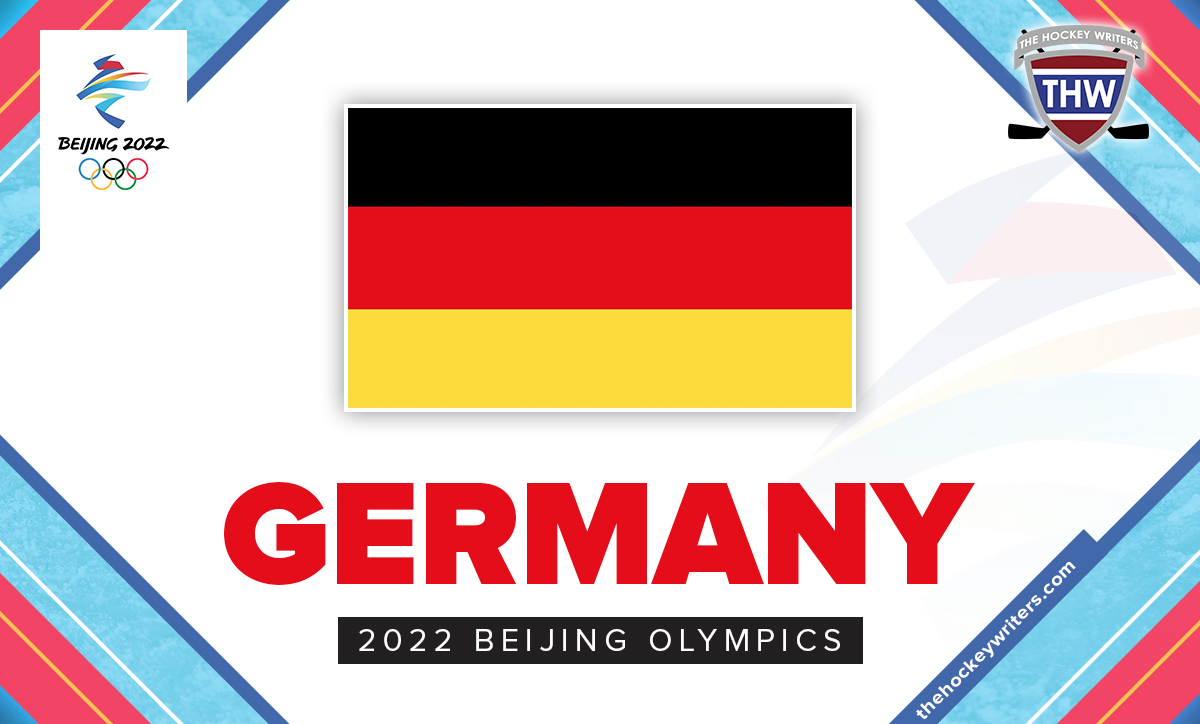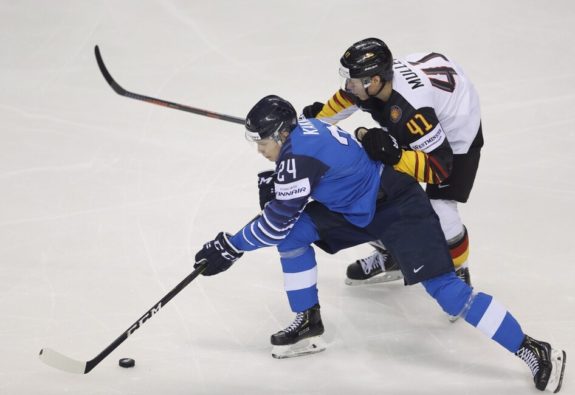Germany got off to a strong start against Team USA, scoring early into the game’s opening period, but they ultimately fell victim to America’s offense, losing 3-2 in the final game of the group stage. Patrick Hager, one of the stars for Germany in 2018, scored the team’s first power play goal of the tournament just two minutes in. Germany had gone 0-for-6 on the man advantage in their first two games, while the American squad hadn’t given up a power-play goal in their first two games. The Americans would get one back, with Steven Kampfer scoring on their first power play of the game after Tom Kuhnhackl took a penalty for holding. It was the Americans’ third goal on the man advantage in nine attempts.
Matt Knies made it 2-1 early into the second after a goal-mouth scramble saw goaltender Danny aus den Birken lose his stick. Head coach Toni Söderholm challenged the play for goaltender interference but after a quick review, it was clear there was none, forcing Germany into a penalty kill following the goal against. Despite a few instances of the Americans taking control of possession in Germany’s end, the score remained 2-1 after two periods with a pending penalty to the Germans. Team USA and Germany would trade third-period tallies, but the Americans closed out Germany to remain undefeated and finish as the top team in Group A.

Ending the group stage with a 1-2-0 record, Germany finishes third behind Canada and Team USA. They will enter the elimination stage with a chip on their shoulder. Much like they did in 2018, Germany will look to erase any doubt set during the group stage and pursue a second consecutive medal finish.
A Dump-And-Chase Affair
Unable to match the Americans’ speed, the Germans relied heavily on a dump-and-chase strategy. In the opening frame, Germany’s forwards placed heavy emphasis on soft-dumping the puck into corners and wearing down the Americans’ defense with body checks in the corners, taking the physicality to them. While the strategy paid off early, even earning them a power play and a subsequent goal, the Americans caught on quickly and shifted their gears to minimize the damage they took in puck battles. As a result, the game started to open up as the first period progressed, a benefit the Americans welcomed. Despite the end-to-end rushes, Germany managed to hold off the Americans and take a 1-1 tie into intermission.
Related: 2022 Olympics: 3 Takeaways from Canada’s 5-1 Victory Over Germany
The Germans amplified their approach in the second period, crashing and banging anything in red, white, and blue. The mentality started to pay off, as there were a couple of instances where the American defense mishandled and turned over pucks along the boards. With Germany’s habit of working hard in corners and utilizing their gritty nature, they were able to manifest some puck possession in the offensive zone. The only issue that remained was their shot attempts were coming from the outside with no traffic set up in front of goaltender Drew Commesso.
Aus Den Birken Stands Tall
Making his first appearance at the 2022 Olympic Games, aus den Birken faced the behemoth task of holding down the fort against the best offensive team in the tournament. Heading into Sunday morning’s game, the Americans had 12 goals in their first two games combined, beating China 8-0 and following it up with a 4-2 victory over Canada. It was a tall task for a 36-year-old who hasn’t played an Olympic game since the gold-medal game against Russia in 2018.
It should be a surprise to nobody who has followed aus den Birken throughout his career over the last ten years. A vital part of the 2018 German squad that took home the silver medal, aus den Birken has been a steady force in the DEL over the last decade. With Kölner Haie and EHC München, he’s averaged a .920 save percentage since the 2010-11 season, winning 20 games or more in six of those seasons. It’s a shame aus den Birken was never given a shot at the NHL level given his competitive nature and steadying presence between the pipes.
Unfortunately for him and the Germans, the Americans’ offense proved to be too potent to hold at bay, as Team USA broke free in the third period to take a commanding 3-1 lead. They would never look back, holding off a hungry German squad hoping to end the group stage with a win.
Stay Out Of The Box
In what has become a trend in games involving Germany, the parade to the penalty box was in full effect on Sunday. Through 40 minutes of play, the Germans and Americans had combined for 11 minor penalties. Germany’s five penalties led to the United States gaining full momentum and flow of the game, scoring once on the power play while adding a third goal in the game just 47 seconds after another power play expired. Germany did all they could do to block shots and take away passing lanes, but the American offense had too much firepower and it showed as the game wore on.

Both Kuhnhackl and Marcel Brandt were called for holding, while the team was assessed a penalty for delay of game after a questionable goaltender interference call was unsuccessful. Despite aus den Birken’s goal-mouth scramble on the Americans’ second goal, it was clear he was never interfered with. Fabio Wagner took a cross-checking penalty late into the second period, which opened the door for the United States to take a commanding two-goal lead early in the third period. The little things eventually compile into one big thing, and the elephant in Germany’s room at the moment is their lack of discipline.
As the group stage ends, Germany now shifts their focus to the elimination stages with a few things in mind. One is their lack of offense through the tournament’s first three games. Dominik Kahun, with one goal and two assists, leads all Germans in points. They’ll need him to continue his point-per-game pace and hope the remainder of the top six catches up. The back end played a pivotal role in earning the silver medal back in 2018, and they’ll need to have another strong showing in 2022. Finally, Germany’s discipline has been a concern since the start of the tournament and they’ll need to address that. Maintaining a strict, physical style while keeping away from stick and holding infractions is key for a team that wishes to keep the games close. If they can find a way to combine these elements, it’s a possibility they surprise the hockey world once again.